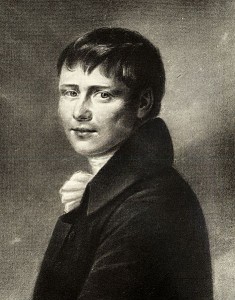
Reading Kleist’s stories hurts, he stabs a dagger into my heart, I feel the world is wrapped in hopelessness, I feel paralyzed, and I feel something is true. Living can be a difficult task and involves mistakes, and this is brought painfully to life in Kleist’s writings. The uncertainty of life is brought forth in Kleist’s story, and it draws me in. I like the way in which Kleist is able to portray the fragility of social life, that law and order is man-made and that trust is a vulnerable commitment.
The curriculum at ISU features two of Kleist’s works and an exhibition focusing on Kleist’s life. Hence, I have been given an opportunity to work with a writer that I was not that familiar with. A previous encounter with two of Kleist’s stories had started a fledgling admiration for him and during this summer course, the admiration has not withered but only grown stronger.
When Kleist was still living, his fame was limited; a lot of critics blame it on Goethe – the Godfather of German literature – who did not like his writing. To Goethe, Kleist’s stories were destructive not devotional. Morality and security break down, death and destruction are omnipresent, and as a reader you sense that the next catastrophe is just around the corner.
Besides the all-pervading apocalyptic atmosphere, Kleist also stresses the unpredictable aspects of life. At the end of the day we cannot plan our life no matter how hard we may try. We can act but never predict our opponent’s reaction; we can only guess and then act accordingly but guessing is dangerous – it might lead to mistakes and failures. Kleist is extremely aware of this and he offers no illusions about a world where it will be possible to prevention catastrophe and acquire certain knowledge – such a place is a utopia and those places do not exist.
The Greek philosopher Aristotle wrote in his work “Poetics” that the most tragic is when misfortune is brought upon a common man not because of vice or depravity but by some fault on his own part; hence his fall is self-inflicted caused by an action with consequences he could not possibly have foreseen.
Reading “Die Verlobung in St. Domingo”, one of Kleist’s last stories, Aristotle came back to me. Deep down I knew the catastrophe was approaching, but a small hope that this might not be the case was nourished by the heroine’s actions. Toni wants to save her lover and success seems within reach but all is changed because Gustav, the man whose life she fought for, misinterprets her actions and shoots her. It is so profoundly tragic because everyone else – the reader and other characters – know that Gustav is mistaken. Had Gustav only requested an explanation, had he only hesitated for a moment, this would not have happened. Alas, he realises this too late.
The bullet in Toni’s heart makes everything irreversible. Kleist’s characters live their life forward but can have no hope whatsoever of understanding what is actually going on before an event has taken place. Life can only be understood backwards – it is sad, it is true and can be very depressing. Understanding and insight always arrive too late and is therefore useless in guiding us through life.
On November 21st, it will be 200 years since Heinrich von Kleist committed suicide. He himself had faced the same uncertainty as his characters, he had realised that it was impossible to get to a deeper and truer understanding of the world. Kleist shot himself on the shores of the Wannsee Lake on the outskirts of Berlin and achieved the only certain thing in life: Death.
Death is the moment that puts an end to all uncertainty, where nothing more can be added to disturb the perceptions and interpretations of the world. When it comes the world stands still, not because we succeed in stopping it and get some perspective, but because we ourselves step out of the current of time.
Kleist’s characters are caught in life and every action in life has consequences. When I think about Kleist’s work, I really appreciated this aspect in his writing. He deals with the uncertainty of life in such a way that the reader is not left untouched. The characters live in the realm of uncertainty and this uncertainty finds its way into the reader’s experience.
Reading Kleist, I will never be able to say: “This is what happened” or “This is true”. I will never be able to make an interpretation that can contain the whole narrative or explain everything. I see the unpredictability of life in Kleist’s fictional universe and I become aware that my own world – even though I have not yet found myself in a situation of complete destruction – somehow resembles Kleist’s universe of fragility and velocity.
The uncertainty and unpredictability of life never goes away. This might be an obvious fact about life, and writing about it might be simple and unoriginal, but the fact is that Kleist makes it so powerful and vivid, and it makes me see further than before. His writing touches me, it strips me of my romantic, harmonious illusion about the world – and that hurts.
by Christine Toft (ISU’11, Denmark)
